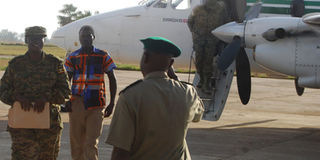Amnesty fails to give 6,000 ex-rebels resettlement package

Back. A former LRA member is escorted by UPDF officers after his arrival at Gulu airfield from the Central African Republic early this year. Many ex-rebels who renounced rebellion are yet to received their resettlement packages. PHOTO BY TOBBIAS JOLLY
What you need to know:
Protest. Acholi sub-region who have since accused the government of failing to resettle and reintegrate the returnees.
GULU. For the last eight years, the Amnesty Commission has not given resettlement packages to a total of 6,500 former members of insurgent groups who have denounced rebellion.
The Amnesty Commission that was established by the Amnesty Act of 2000, is mandated to receive and reintegrate former rebels back into their communities.
The returnees are mainly from major rebel groups that include the Lord’s Resistance Army Rebels (LRA) with formerly operated in northern and north eastern Uganda; West Nile Bank Front and Uganda National Rescue Front II in West Nile region; and the Allied Democratic Force (ADF) in Western region.
Between 2005 to 2009, Amnesty Commission could give items such as hoes, household items and Shs235,000 as start-up capital to the former rebels.
However, failure by the commission to give such items to the returnees for close to eight years now has not gone well with leaders in Acholi sub-region who have since accused the government of failing to resettle and reintegrate the returnees.
Gulu District chairperson Martin Ojara has tasked the government to do more in resettling and reintegrating the former LRA fighters.
“Some were abducted as children and are now adults who returned with children. They need both physical and psychological support since they missed out on many opportunities in early life,” he said.
Omoro District chairman Douglas Peter Okello asked government to design projects specifically targeting LRA returnees.
“Even before the package was suspended, it was not sustainable. These people’s challenges are unique and need deliberate effort to address them,” he said
He added that Peace Recovery and Development Programme (PRDP) and Northern Uganda Social Action Fund (NUSAF) have no clear guidelines for facilitating these categories of people.
However, Amnesty Commission officials revealed that they have been able to fully resettle 21,000 returnees, leaving out at least 6,500 due to finance constraints since 2009.
“We suspended the resettlement packages to former members of various rebel groups who have surrendered and have been pardoned under the Amnesty Act due to lack of funds,” the Amnesty Commission Public Relations Officer, Mr Charles Draku, said.
He added that when Amnesty Commission came into place in 2001, there was no package given out to those who had returned until 2005.
The package was, however, a World Bank grant under Multi country Demobilisation and Reintegration Programme (MDRP) totaling $4.2 million (Shs15.1 billion)
Mr Draku explained that over the years, World Bank, countries and individuals were pooling funds together, and have since suspended the support.
However, he said they are hoping that government will come to their rescue.
The State Minister for Northern Uganda, Ms Freedom Grace Kwiyucwiny, told Daily Monitor that local leaders should ensure that the returnees benefit from the existing government programmes. “We do not want to have specific programmes that are targeting them for fear of stigmatisation. We want them to benefit just like any other ordinary person within the communities,” she said.


